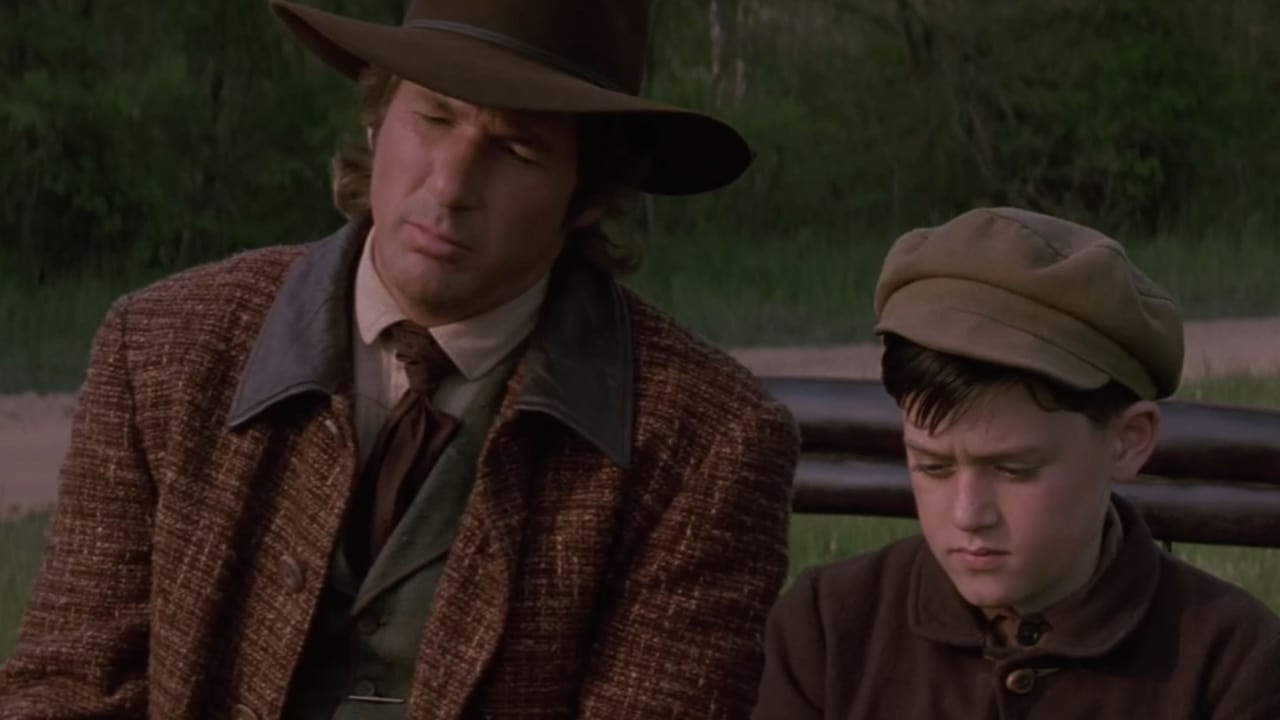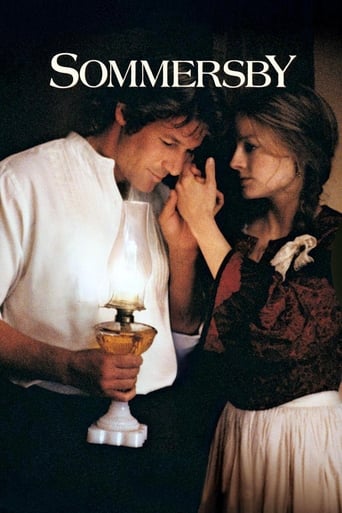Wuchak
Released in 1993 and directed by Jon Amiel, "Sommersby" stars Richard Gere as a Confederate soldier returning to his rundown estate in Tennessee and his wife, Laurel (Jodie Foster), after a long six years absence. Curiously, Laurel discovers that the war has changed Jack for the better. Bill Pullman plays his rival for Laurel's affections while James Earl Jones appears as a judge in the final act.This is such a well-done Civil War drama, taking place just after the war in 1866-1867. The story is contrived, but executed believably with convincing performances. Contrived or not, something like this COULD happen, if you reflect on it. I can't say more because it's best that you go into the movie without knowing the revelations of the final act. The first half is low-key, but it's just a foundation for the realistic thrills of the mid-point and the suspenseful drama of the closing act.The film runs 114 minutes and was shot in Virginia with the opening winter scene filmed at Snowshoe Mountain Ski Resort, West Virginia.GRADE: B+ ADDITIONAL COMMENTARY ***SPOILER ALERT*** A clueless reviewer criticized the film on the grounds that "this story fell a bit flat for me when Jack, for some reason, doesn't tell the same (true) story (that clarifies the identity confusion) to the court, that he does to his wife in the final jail scene." This is incredible because the movie plainly reveals several reasons why Jack didn't want to tell the truth that he wasn't really Jack Sommersby: (1.) The freed blacks and others who bought & farmed parts of his land would lose it; (2.) his wife & daughter would be condemned as an adulteress and a bastard child respectively; (3.) he "buried" Horace Townsend forever when he buried the real Jack Sommersby; he wasn't willing to "resurrect" that wicked loser, even at the cost of his life.And (4.) If jack was proved to be Horace, and was released, another court would have arrested him on the grounds that he was a liar, an impostor and a thief. That court would NOT have released him on the grounds that he had found love and done charitable things while impersonating a dead man. He would have gone to prison and possibly even died for his actual crimes.So dying for a cause he believed in, for people who respected him, made more sense than dying without any honor or legacy whatsoever.
Spikeopath
Directed by Jon Amiel, Sommersby is adapted from the historical account of 16th Century French peasant Martin Guerre. It was previously filmed as The Return of Martin Guerre in 1982. It stars Richard Gere, Jodie Foster and Bill Pullman. Music is by Danny Elfman and cinematography by Philippe Rousselot. In simple terms the film is about a man (Jack Sommersby) who went off to war and was presumed dead by his wife (Laurel) and the village folk of the village where he lived. Some 9 years later he returns a changed man, back in the marital bed and a hero to the village. But then questions start to crop up and it becomes a possibility that this man may not after all be who he claims to be. Sounds bizarre for sure, yet it's a true story, and a fascinating one at that.For this American version we get top line production values across the board, with the film propelled with grace and skill by Gere and Foster in the lead roles of Jack and Laurel Sommersby. Director Amiel rightly uses the slow burn approach, a consideration to the art of story telling. This draws the viewer firmly into the post Civil War period and lets us get to know the principal players and their surroundings.The core narrative thrust is a moving romance, one consistently under pressure of a mystery to be proved or disproved. But there's also economic issues to hand, very much so, and the vile stench of racism still hangs in the air. There's a lot going on in Sommersby and it never sags because of it. Also refreshing that in spite of some critical grumblings in some quarters, the ending is potent and not very Hollywood at all. It's not flawless and although it's based on a true story, some suspension of disbelief is needed as regards physical appearance of Jack and his means and motives. Yet this is a lovely film, simple in story telling structure, beautifully photographed and performed, it very much feels and plays like a classic era period piece. 8/10
James Hitchcock
In 1548 a young man named Martin Guerre disappeared from the southern French village of Artigat. Eight years later, an impostor named Arnaud du Tilh arrived in Artigat falsely claiming to be Martin. Although he was accepted as such by Guerre's wife Bertrande and his family, rumours began to spread about his identity, and he was eventually exposed when the true Martin Guerre returned to the village. A number of writers and film-makers have taken inspiration from these events, including Daniel Vigne, the director of "Le Retour de Martin Guerre" from 1982. "Sommersby" is sometimes regarded as a remake of Vigne's drama, but it might more accurately be described as being loosely inspired by the real historical events upon which the other was much more closely based. Jon Amiel transfers the action to the American South, immediately after the American Civil War. Jack Sommersby, is a landowner who left his farm to fight in the war. Nothing further has been heard from him, and everyone, including his wife Laurel, presumes that he is dead. Nobody, including Laurel, is particularly worried by this; Jack was an unpleasant individual, an abusive husband and a neglectful father to his young son Robert. Laurel is even planning to marry a neighbour named Orin Meacham. And then one day a man returns, claiming to be Jack. Yet, although he closely resembles Jack Sommersby physically, he is quite different in personality. He is kind and loving to Laurel and Robert and tries to help his poorer neighbours by selling parts of his farm to them. He is also a shrewd businessman, as evidenced by his scheme to revive the local economy by growing tobacco. He explains this change in his character by saying "War changes you; makes you appreciate things". The only people unhappy about Sommersby's return are Orin, whose plans to marry Laurel have been dashed, and racist Confederate veterans who resent the fact that Jack is trying to help former slaves as well as his white neighbours. Orin begins to suspect that the newcomer is in fact an impostor. (Which indeed he is). I am surprised that "Sommersby" has such a low rating on this board (currently only 5.9) and that it has been criticised so fiercely. One of the grounds of criticism has been the cultural snobbery of those, on both sides of the Atlantic, who assume that any Hollywood remake of a European film is bound to be a vastly inferior copy of the original. Yet, although Vigne's film is undoubtedly a good one, I think that Amiel's can stand comparison with it. There are, moreover, important differences between the two films. The real Martin Guerre appears in the film that bears his name, whereas here we never see the real Jack Sommersby. (We learn that he did indeed die in the war). Both impostors are placed on trial for their lives, but for different reasons. Du Tilh is tried for his own crime, that of impersonating Martin. (Adultery and fraud were capital offences in the France of that period). The false Sommersby, a former schoolmaster named Horace Townsend, is not tried for anything he has done himself, although there are plenty of murky episodes in his past, quite apart from the question of criminal impersonation. He is tried for a murder committed by the man whose identity he has stolen. There is no doubt that Sommersby was the killer, so the only way Townsend can save his neck is to admit his deceit and prove his true identity. Yet this is something he is strangely reluctant to do. Richard Gere can at times seem too laid-back, especially in comedies and lighter films. Yet when he is given more demanding roles, he is often capable of rising to the challenge, especially in films like "The Honorary Consul" and "Primal Fear", and "Sommersby" must count as one of his best performances, as Townsend is a very complex character. He is a man with a shady past who commits what is, to all intents and purposes, a criminal deception, yet who does for idealistic reasons, reasons for which he is prepared to lay down his life. To highlight all the varying facets of Townsend's character, while making him appear both believable and sympathetic, was a difficult task, but one in which Gere succeeded very well.Jodie Foster is equally good as Laurel, a woman torn between the need to believe that the man with whom she has fallen in love really is her long-lost husband miraculously changed for the better and the fear that her new-found happiness may in fact be based on a lie. This was one of a number of stellar performances in the late eighties and early nineties- others include "The Accused", "The Silence of the Lambs" and "Nell" which established her as the most exciting young actress of the period. There is also a good contribution from Bill Pullman as Orin, a man torn by jealousy and resentment and yet not wholly bad. Visually, the film is much darker than "Le Retour de Martin Guerre", which seemed to be suffused by a rich, warm light. Apart from the green of the vegetation, it is dominated by dull tones, particularly greys and browns, perhaps appropriate for a film which takes place in a country torn by civil war. It seemed to me that Amiel was taking the theme of the earlier film and using it to explore America's own history, as well as some dark areas of human psychology, the philosophical issues surrounding personal identity and the question of atonement for past sins. Indeed, it perhaps goes more deeply into these issues than did Vigne's film which did not, for example, explore deeply the reasons why du Tilh decided to steal another man's identity. If this is a remake, it is one which deserves to be mentioned in the same breath as its predecessor. 9/10

